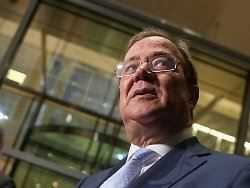Day two after the general election: Laschet is still in office, Brinkhaus re-elected as parliamentary group leader, Merkel looks disinterested. Söder declares the traffic light to be likely and congratulates Scholz, while Laschet portrays the SPD candidate for chancellor as a bad coalition.
The first major power struggle after the Union’s defeat in the Bundestag election last Sunday came to a peaceful end: Ralph Brinkhaus was confirmed as head of the joint CDU and CSU parliamentary group in the Bundestag, albeit not for a year, as would normally be expected.
CDU boss Armin Laschet originally wanted to ensure that Brinkhaus only stayed in office on a provisional basis until the first session of the newly elected Bundestag in a month. Brinkhaus refused and was supported by the CSU. State group leader Alexander Dobrindt, who had already been confirmed in his office in the afternoon, said after a meeting of the CSU members of the Bundestag that he would not agree that the Union parliamentary group leader should be elected “only for four or six weeks”. Next to him stood the CSU chairman Markus Söder, who declared that it was important “that we are able to work”. A compromise was reached between Söder and Laschet on Tuesday: Brinkhaus will be elected, but only for six months until the end of April.
The question of the parliamentary group chairmanship was about the following for Laschet: If the Union has to go into the opposition, the post is one of the few offices that the CDU and CSU in Berlin still have to assign. In addition to Brinkhaus, there are several interested parties. The North Rhine-Westphalian CDU politicians Jens Spahn, Friedrich Merz and Norbert Röttgen are said to have corresponding ambitions.
The parliamentary group must be able to work because the Union hopes that exploratory talks will take place with the Greens and the FDP. In the evening, both Brinkhaus and Dobrindt made it clear that the parliamentary group would then have to be involved in any case – they themselves.
Both emphasized that they would “not go along with every compromise” in any Jamaica explorations, “we want to keep our brand core,” as Brinkhaus said. Dobrindt said there could be no “sell-off”. The parliamentary group’s participation “serves to secure the core brand of the CDU and CSU in the negotiations”. That sounded a lot like there was a certain distrust of other potential negotiators – apparently against Laschet. However, neither Brinkhaus nor Dobrindt explicitly questioned the CDU leader. In secret, however, Union MPs are skeptical about his political future.
“Merkel was only on the cell phone”
Brinkhaus had previously been elected parliamentary group leader by 85 percent of the newly elected Union MPs, and his term of office ends on April 30, 2022. But he wants to “keep trying” to do the job afterwards. The parliamentary group’s meeting was also attended by members of the previous legislature who had lost their mandate. Chancellor Angela Merkel, who was also present, did not speak up. One participant said she was “only on the cell phone” and looked “completely disinterested”.
According to Brinkhaus, the debate was “actually relatively factual”. “Certainly there was one or the other disappointment, we don’t need to fool ourselves.” According to participants in the meeting, he himself had said that the top candidate had not reached the voters. Laschet apologized to the elected MPs and admitted mistakes. With a view to government opportunities for the Union, he said there were “strong signals” from the FDP in the direction of the Union. How Olaf Scholz deals with coalition partners can be seen in Hamburg when he was leading a government there.
How it should come to talks with the Greens and the FDP remained open on Tuesday evening. In the afternoon, Söder had congratulated the SPD Chancellor candidate Olaf Scholz on receiving more votes in the Bundestag election than the Union. So far, Laschet has not given the SPD such a public congratulations. “Olaf Scholz clearly has the best chances of becoming Chancellor at the moment,” said Söder. Dobrindt said a sentence at this appearance that must be understood as a sharp criticism of Laschet: It was “a very, very difficult election result, it is a defeat for the Union and it is one of the most unnecessary defeats of the past decades”.
Despite all this, there is “a small possibility” that the traffic lights will not come and the Union must prepare for this. Brinkhaus expressly agreed with Söder’s remarks in the afternoon in the evening, but also said that the Union would “offer talks”. Dobrindt called for quick negotiations. There could only be a “very, very narrow schedule” for explorations, “we’re talking about a few weeks here”. But there is no schedule. “Our offer is ready,” said Brinkhaus, “now let’s see what happens in the next few days.”
When Brinkhaus and Dobrindt performed together, Laschet and Söder were not there. After the meeting of the Union parliamentary group, Laschet said: “We will now speak to the FDP, to the Greens, in the next few days. Our offer of talks is available. And I think that factual discussions among Democrats are now correct.” The Union “did not win” the election, said Laschet. In a confusing situation like this “every democratic party must be ready to take on responsibility. And that is us”.
It is unclear when the talks announced by Laschet will take place. He himself flies back to North Rhine-Westphalia on Wednesday, where he is still Prime Minister.
